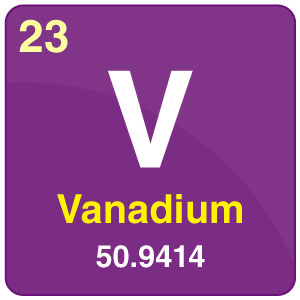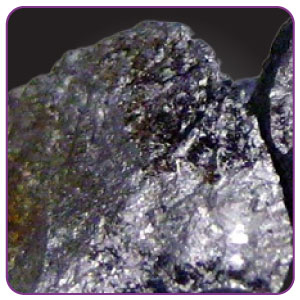Vanadium

| Symbol | V |
| Atomic Number | 23 |
| Atomic Mass | 50.9414 g.mol -1 |
| Discovered by | Nils Sefstrom in 1830 |

Table of Contents
Chemical Properties Of Vanadium
| Group | 5 | Melting point | 1910°C, 3470°F, 2183 K |
| Period | 4 | Boiling point | 3407°C, 6165°F, 3680 K |
| Block | d | Density (g cm−3) | 6.0 |
| Atomic number | 23 | Relative atomic mass | 50.942 |
| State at 20°C | Solid | Key isotopes | 51V |
| Electron configuration | [Ar] 3d34s2 | CAS number | 7440-62-2 |
| ChemSpider ID | 22426 | ChemSpider is a free chemical database | |
What is Vanadium (V)?
- A rare, soft, ductile grey-white coloured element, which is found combined with minerals and is used to produce alloys like ferrovanadium. Due to the presence of a protective film of oxides on the surface, it helps with metal corrosion.
- In the periodic table, vanadium is found just to the right side of the titanium. A scientist by the name of Del Rio from Mexico was the first person to discover vanadium in the year 1901. Later this element was named after a Scandinavian goddess named Vanadis by Sweden scientist Nils Sefstrom.
Applications of Vanadium
- Purification: Vanadium is used in nuclear power plants and in several other purification processes.
- Uranium Purification: Vanadium is one of the many elements used in the purification of Uranium that is used for nuclear purposes.
- Springs and alloys: The physical characteristics of vanadium make it useful to manufacture springs. Vanadium is also used to make steel alloys in industries.
- Magnets: The specialised kind of magnets that are used for advanced research functions with superconducting capabilities contains vanadium. They are used because of their unique physical properties and cannot be fabricated easily.
- Ceramics: Traces are found in ceramics, sometimes also in paints and dyes.

Comments